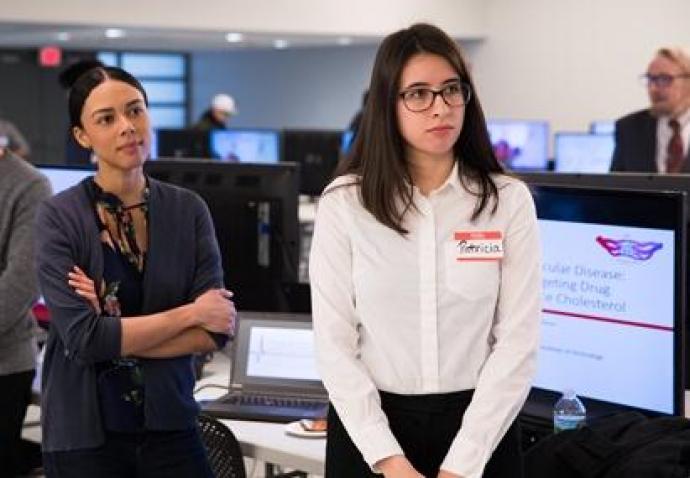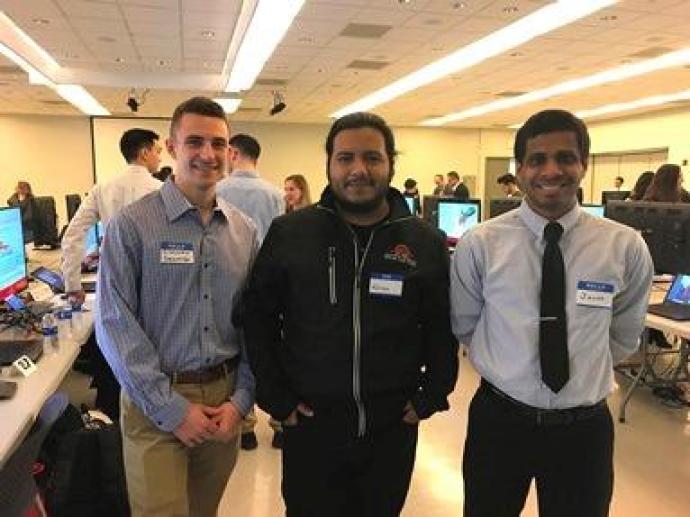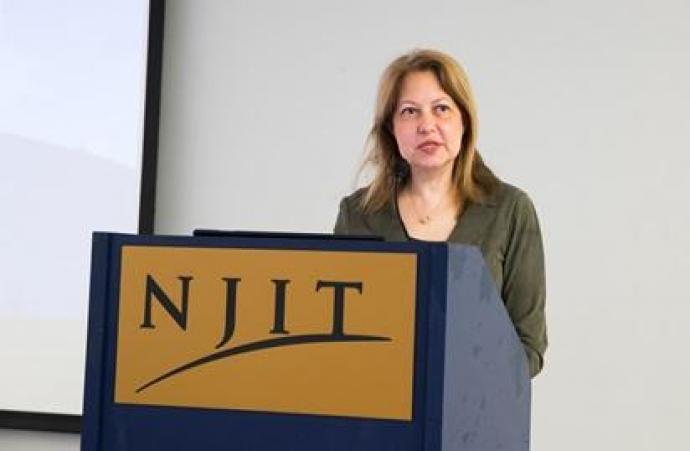Innovation Day 2018

An interdisciplinary engineering team developing an enzyme-blocking drug designed to reduce levels of LDL, or “bad cholesterol,” was the winner of this year’s TechQuest challenge, announced this week at NJIT’s sixth annual Innovation Day.
Senior Victoria Harbour, a chemical engineering major, and junior Patricia Iglesias-Montoro, a biomedical engineering student, (below) are synthesizing and testing a small molecule, hydrogel therapy to prevent PCSK9, an enzyme circulating in the bloodstream, from interfering with the body’s mechanisms for metabolizing cholesterol. The pair notes that people with naturally occurring PCSK9 mutations that disable the compound have lower levels of LDL, which can lead to heart disease.
"Cardiovascular disease (CVD) is the number one cause of death for Americans, and accounts for one in three deaths worldwide. It’s an interesting and important example of how there is no distinct division between biology and society when it comes to health. On one hand, lifestyle can be a huge contributor or preventative measure to CVD, on the other, altering biological pathways medicinally may be equally important for treatment," says Harbour, adding, "Currently, the PCSK9-targeting CVD drugs are immune-system based and precisely targeted, but they're very expensive. The current CVD treatment is statins, which are much a cheaper small molecule drug, but they are not as precisely targeted and are associated with a lot of side effects - mainly muscle problems. We are developing a small molecule hydrogel drug that would be less expensive than immunotherapy drugs, but the side interactions will not be as detrimental as statins. The hydrogel is inehected into the body to avoid needing to cross oral or gut barriers."
"There is a pressing need for an affordable, effective cholesterol-lowering medication throughout the world," Iglesias-Montoro noted.

Innovation Day is a showcase of cutting-edge, student-led research that includes inventions that improve lives, novel business ideas, computer games and fundamental scientific research. This year, more than 60 student projects – from mapping applications for the transportation industry, to human control interfaces for surrogate robots, to solar car prototypes – were on display at the Campus Center.
Two teams competing for the first time in the annual challenge also collected prizes: the first, led by seniors John Pentangelo and Younes Younes, both chemical engineers, were tapped for their work on an efficient method for manufacturing oral films, an alternative to pills; the second, led by Shaurya Chandhoke ’20 and Hamlet Jaquez ’19, both computer scientists, won for their work on a software system that uses LIDAR (laser imaging detection and ranging sensor) to create 3D maps of roadways to detect damages and identify needed repairs in an efficient, cost-effective way.
Junior Leidy Manzueta, a civil engineer, took a prize for an innovative water purification process that uses nanobubbles in gases such as pure oxygen or ozone to promote rapid oxidization and decomposition of organic water pollutants ad algal biomass.
The winners are chosen by the Undergraduate Research and Innovation (URI) program’s external advisory board, composed of tech company executives, R&D specialists and inventors.
The board’s co-chair, Govi Rao, president and CEO of Noveda Technologies, pointed to the growing sophistication and savvy of the projects on display, not just in terms of technology, but of topic choices and their multidisciplinary execution as well.
“We talk about getting outside of the box – these students don’t have a box,” Rao said, adding, “When I come here, I walk away thinking that our society is going to be okay.”
Several teams working together to build a solar car to compete nationally later this year - selected as prototype winners and finalists in a new category on Innovation Day - include computer, electrical, mechanical and engineering technology majors as well as mathematicians. (Featured below are sophomore Giacomo Gesualdo and senior Adrian Lopez, members of the carbon fiber body team, and Jason Murzello, a member of the motor control team.)

While applauding the students’ creativity and drive, Provost Fadi Deek expressed gratitude for the faculty members who “don’t sit behind closed doors and do their own research” and the industrial mentors, community members who support them with guidance and funds.
A growing number of these undergraduate researchers are taking their innovations on the road: to technology conferences, along commercialization pathways such as the National Science Foundation’s I-Corps program and before local venture investors.
Mark Quiles ’18, a finance and marketing major who created a company called League of Lifeguards that recruits lifeguards and matches them with jobs such as guarding at pools, parties and events like the Tough Mudder, is already commercializing his idea. Started last summer using social media, Quiles is developing the service into an app that will function like Uber or Airbnb. He won the Newark Innovation Acceleration Challenge earlier this year for what his advisor, Michael Ehrlich, an associate professor of finance, called a clever solution for an unmet need.
In the keynote speech, Andrea Colby, (below) an intellectual property attorney who has worked for firms such as Johnson & Johnson, Morgan & Finnegan and Union Carbide Corporation, advised the students to begin thinking about protecting their ideas as soon as they begin developing them.
“It’s never too early to create an IP strategy,” Colby said, noting that inventors increasingly conduct experiments that advance their ideas and patent protection at the same time.
“And don’t share your ideas on social media,”she added.

Innovation Day assembles the university’s key undergraduate research and innovation programs and competitions. These contests and programs are designed to help students become researchers and innovators with the know-how, technical savvy and experience to identify and address important unmet societal needs.
The programs include:
TechQuest, an undergraduate invention competition sponsored by James Stevenson, a retired Honeywell scientist and consultant at Stevenson PolyTech LLC.
The Ronald E. McNair Postbaccalaureate Achievement Program, which helps students compete for awards for their research presentations and enroll in graduate programs.
The Undergraduate Research and Innovation Program, which enables students to become researchers and to select projects that will address societal problems, enhance our quality of life, and contend with global challenges.
The Student Innovation Acceleration Club, which gives students the forum to develop business concepts utilizing a lean start-up methodology.
The Newark Innovation Acceleration Challenge, a collaboration between NJIT and Capital One Bank, which aims to ignite business development in Newark by empowering budding entrepreneurs.
Innovation Day is sponsored by the James Stevenson Foundation, the Ronald E. McNair Post-baccalaureate Achievement Program, The National Science Foundation, the Gustavus and Louise Pfeiffer Research Foundation, PSEG, The Hearst Foundation, The Needham Foundation, the NJIT Office of the Provost and the NJIT Office of Research.